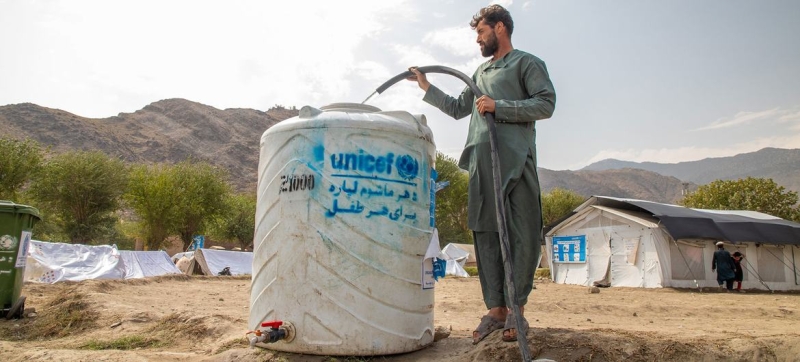
A man fills a water tank at a camp in Kunar province, Afghanistan. Consequences of the earthquake in Afghanistan: children are at risk of preventable diseases Humanitarian aid
More than 212 thousand children in Afghanistan are at risk of contracting acute watery diarrhea and other dangerous water-borne diseases, the United Nations Children’s Fund (UNICEF) reports. The increased risk of an outbreak of infections is associated with the effects of the earthquake that occurred on August 31 in eastern Afghanistan, near the border with Pakistan.
The tremors have destroyed water, sanitation and hygiene infrastructure in the affected areas.
“The earthquake destroyed homes and claimed many lives, and now threatens to claim even more through disease,” a UNICEF representative said in Afghanistan Tajudin Oyewale.
He noted that children in affected areas are living in overcrowded camps or temporary shelters without access to toilets and safe water.
“These are “ideal” conditions for a looming medical disaster,” Oyewale stressed.
Diseases that can be prevented
Acute watery diarrhea, according to the World Health Organization (WHO), is one of the three leading causes of death among children under five years of age and annually claims the lives of more than 400 thousand children.
At the same time, as WHO notes, the disease can be prevented with the availability of clean water, proper sanitation and hygiene products – these are the basic conditions that thousands of families are now deprived of Afghanistan.
According to UNICEF, the earthquake destroyed 132 water sources, leaving many families without the ability to wash their hands or access safe water. In 80 percent of communities, people are forced to relieve themselves in the street as most toilets have also been destroyed. Lack of soap and other hygiene products increases the risk of spreading infections.
Health facilities are already reporting an increase in cases of dehydration and skin diseases, warns UNICEF.
Urgently needed funding
UNICEF supports people in more than 60 countries to help prevent disease and improve sanitation. In affected areas of Afghanistan, the agency is installing temporary toilets, distributing hygiene kits and providing drinking water by tanker trucks, while restoring destroyed water supplies.
However, the organization says donors have provided only half of the $21.6 million needed for emergency response. response. UNICEF calls on international partners to quickly provide funds.
The World Food Program (WFP) also faces a funding gap of $622 million over the next six months. WFP operations are under threat not only in Afghanistan, but also in the Democratic Republic of the Congo, Haiti, Somalia, South Sudan and Sudan. Afghans.
UNICEF and its partners warn that without urgent investment, efforts to prevent a humanitarian catastrophe are on the brink of collapse.
